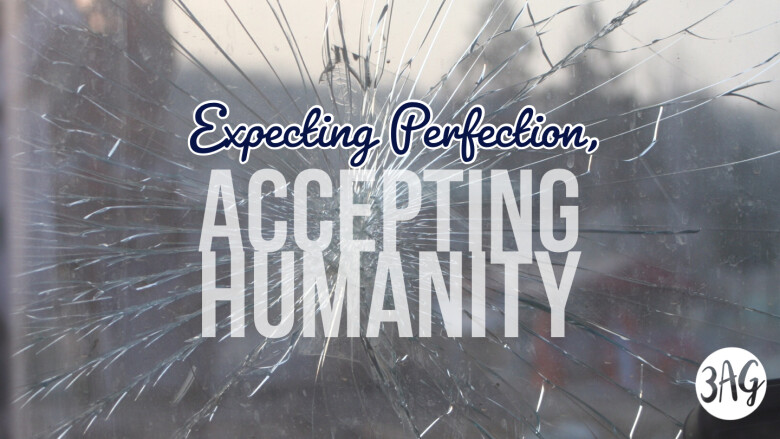Recycling Pain
Romans 8:28
Expecting Perfection, Accepting Humanity
Part 9: Recycling Pain – June 9, 2019
We all have sentences, paragraphs, and chapters of life that we’d like to forget—things that are hurtful, humiliating, and even horrible. We’d like to have creative control so that we can edit those things out and only show the parts of our lives that are healthy, helpful, and honorable.
But we don’t get to do that unless it’s on social media. Life is what it is. Once a sentence, paragraph, or chapter has been written, it cannot be unwritten; it cannot be rewritten. We can change what follows it, but we can never undo it. It might as well be set in stone.
It’s ironic that the stuff we’d like to edit out is so often the stuff God can use the most…if we could learn to trust him with it.
That’s a curious take on things, “if we could learn to trust him with it.” It’s curious because God is intrinsically and ultimately trustworthy. He already knows every detail of our lives—the healthy, helpful, and honorable and the hurtful, humiliating, and horrible. Not only does he know it all, but he’s just waiting for us to hand it over to him—to trust him with it—so that he can put it to good use for our benefit and the benefit of others.
The Apostle Paul wrote some beautiful words to the Christians in Rome. Romans 8:28 (ESV), “we know that for those who love God all things work together for good, for those who are called according to his purpose.”
There are three things we need to understand here.
(1) This promise is only true for those who love God. Otherwise, you’re on your own to make the best of it.
(2) God uses all the raw material we give him—the healthy, helpful, and honorable; the hurtful, humiliating, and horrible; the hurts, habits, and hang-ups—and mixes it together to make something good. He doesn’t throw anything out.
(3) God does all this for his purpose; the benefits we receive are secondary.
I want to give you the bottom line of this message before I preach the rest of it: God wants to use what I want to hide and forget. Say that with me. God wants to use what I want to hide and forget. If we could really learn to trust God—to take him at this word—then we would see him use the circumstances of our lives…we would see him use us in ways we’ve never dreamed.
In this series, we’ve been introducing choices we need to make to unpack our baggage and deal with it in healthy, productive, and godly ways. These are the eight choices:
- Admitting need
- Getting help
- Letting go
- Coming clean
- Making changes
- Repairing relationships
- Maintaining momentum
- Recycling pain
Today, we are looking at the final choice, recycling pain.
I don’t know about you, but I’m not typically interested in recycling pain. Recycling
Listen, folks, our greatest contributions to this world—our greatest ministries—will not be found in our strengths, but in our weaknesses. Remember, God wants to use what we want to hide and forget. He wants us to trust Him and allow Him to recycle the pain so he can use it.
Most of us think that God only uses obviously gifted and extraordinarily talented people, but that’s not true. God uses ordinary people. He does His best work through weak people because people are not helped by our strengths; they’re helped when we’re honest about our weaknesses.
When we understand that God uses our weaknesses and pain, life takes on a whole new meaning, and we can experience real freedom from our hurts, habits, and hang-ups. The proof that we’re truly free is when we can begin to focus outside ourselves when we stop being absorbed with our needs, our hurts, and our problems. Freedom is evident when we can say, “How can I help others?”
This is a good place for us to take a few moments to consider why does God allow pain in our lives? I want to give you four reasons (this is not an exhaustive list).
- God has given us free will.
This is one of the ways God’s image is shown in us. We can choose good or bad, right or wrong, life or death. God even gives us the freedom to accept or reject him.
He could have created us without
Free will is not only a blessing; it’s also a burden. Poor choices cause painful consequences. We make choices that bring pain to ourselves and others.
The thing about free will is that God gives it to everyone. This means that sometimes others choose to do wrong and we get hurt in the process. Many people have been deeply hurt by a parent, spouse, teacher, friend, relative, or someone they didn’t even know. God could have prevented that hurt by taking away a person’s free will. But if He’d done that, He’d have had to take away your free will too.
Pain is part of the free-will package.
- God uses pain to get our attention.
In The Problem of Pain, C.S. Lewis wrote, “Pain insists upon being attended to. God whispers to us in our pleasures, speaks in our conscience, but shouts in our pains: it is his megaphone to rouse a deaf world.”
God allows pain in our lives, but that doesn’t mean He causes it, and it doesn’t mean He enjoys seeing us in pain. As I’ve already pointed out, pain is often a consequence of our poor choices or the poor choices of others.
God allows the consequences of those poor choices to play out. He loves us and wants to lead us out of our pain and into His healing.
When pain or fear gets bad, we spend time wishing we hadn’t made the choices we made. Such thinking is useless. We can’t change the past, so we need to humble ourselves, acknowledge it, own it, and give it to God.
Is it scary? Yes.
Is it risky? Yes.
Is it worth it? Yes
But you can’t learn it’s worth it just by listening to me or anyone else talk about it. You can only know it’s worth it by experience.
Instead of denying our pain, we must allow it to motivate us to get help, to start making healing choices. We rarely change when life is comfortable. We change when we feel the heat. We don’t usually change until our fear of change is overcome by our pain.
- God uses pain to teach us to depend on him.
There’s an old saying, “You will never know God is all you need until God is all you have.” Listen to these words from Psalm 119:71, “My troubles turned out all for the best—they forced me to learn from your textbook” (The Message).
- God wants to use our pain to minister to others.
When we turn to God for healing from our pain—from our hurts, habits, and hang-ups—he comforts us and gives us the help we need…but he doesn’t stop there.
I love what Paul wrote in his second letter to the church in Corinth, Greece: “God is our merciful Father and the source of all comfort. He comforts us in all our troubles so that we can comfort others. When they are troubled, we will be able to give them the same comfort God has given us” (2 Corinthians 1:3b-4, NLT).
Pay close attention to Paul’s words—God comforts us so we can comfort others.
We all have hurts, habits, and hang-ups. Nobody’s perfect. And when we’re hurting, we want someone who understands, someone who’s been through what we’ve been through. We want someone with experience, not theory. We want…we need…someone who can look at us and say, “I’ve been there, I’ve done that, and I’ve overcome it with God’s help…and God can do the same for you.
- Who better to help an alcoholic than someone who has struggled with alcoholism?
- Who better to help someone dealing with the pain of abuse than someone who also suffered abuse?
- Who better to help the person who lost a job and went bankrupt than someone who experienced the same thing?
- Who can better help the parents of a teenager going off the deep end than a couple who had a child who did the same?
- Who can better help someone dealing with the aftermath of abortion than someone who’s had an abortion?
God wants to use and recycle the pain in your life to help others, but you’ve got to be open and honest about it. You’ve got to trust him with it. If you keep it to yourself, you’re wasting it. He wants to use what you want to hide and forget.
So, how do we trust God with our pain so that he can use it to help others?
- Accept your mission.
Every Christian has been given the same mission. It’s called the Great Commission, and it was given by Jesus himself: Go and make disciples of all the nations, baptizing them in the name of the Father and the Son and the Holy Spirit, (Matthew 28:19, NLT).
The greatest need in every person’s life is the need to know Jesus Christ as savior. Other needs exist, but none is as important as the need to know Christ. However, meeting other needs is often how we win opportunities to share the gospel.
That’s why God wants to use your pain. He wants you to use it to plant and water seeds of the gospel so that people can come to know Jesus as savior…not so we can make them feel better, though that can happen. Ultimately, we want to introduce people to Jesus, and we can open some doors by sharing our stories.
- Tell your story.
- Be humble about it. You may have overcome some pain and struggles, but you’re still not perfect, and you never will be. You might have a lot of experience, but you don’t know it all.
- Be real about it. Don’t embellish your story to make it sound better (or worse) than it is. God doesn’t need that kind of help from us.
Who could benefit from hearing your story? The answer is people who are currently experiencing what you have already gone through, people who need to know Christ and the freedom found in Him. Tell God you’re available, then get ready!
Prayer and response
As with many of the messages in this series, this one lends itself to a time of response. If you’re here and you’re ready to trust God with the parts of life you’ve been trying to hide and forget, I invite you to take a bold step of faith and come to the front and say, “God, here it is. Do with it, whatever you can.”
If you haven’t been able to hide and forget, why not let God use it?
Series Information

We have a tendency to judge ourselves and others as finished products when we are all works in progress. We need to learn to accept that fact.
